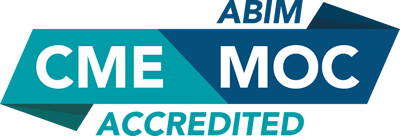
COURSE CREDITS & HOURS
AMA PRA Category 1 Credits™14 ACPE Credits
14.0 (part II) MOC points in medical knowledge in the American Board of Internal Medicine's (ABIM) Maintenance of Certification (MOC) program
4½ Hours of Pharmacology for NPs
COURSE FEES
TARGET AUDIENCE
PROGRAM PURPOSE
The purpose of the nephrology lectures are to equip the attendees with the necessary clinical skills and strategies to identify, evaluate and manage either individually or as part of an interprofessional team, common clinical problems in Nephrology to overall improve patient care.
Topics:
- Urinalysis - A Window into the Body
- Describe methods of urine collection.
- Interpret physical and dipstick examination of urine.
- Identify microscopic elements in urine sediment.
- Solve clinical cases with abnormal urinalyses
- Understanding Diuretics
- Describe classification and mechanism of action of diuretics
- Review clinical uses and adverse effects
- Define diuretic adaptation and resistance
- Acute Kidney Injury
- Review definition, epidemiology, course and burden of AKI
- Recognize common causes of AKI and identify risk factors
- Discuss the medical management of AKI in the hospitalized patient
- Illustrate with case presentation
- Poisonings in Nephrology
- Discuss different medications and poisonings seen in clinical practice
- Review the clinical presentation of these poisonings
- Describe the management of these poisonings
- Disorders of Water Balance
- Define osmolality and tonicity
- Describe approach to hypo and hypernatremia with case presentations
- Review steps and pitfalls in management of hyponatremia
- Renovascular Hypertension
- Review the pathophysiology of renovascular hypertension
- Describe patients at risk for developing ischemic nephropathy
- Describe diagnostic evaluation of renal artery stenosis
- Discuss management of patients with atherosclerotic renal artery stenosis
- Chronic kidney Disease - A Call to Action
- Facilitate timely testing and intervention in patients at risk for CKD.
- Apply appropriate clinical measures to manage risk and increase patient safety in CKD.
- Comanage and refer to nephrologists, when appropriate, to improve outcomes in CKD.
- Dementia vs. Depression (diagnosis/management)
- Distinguish between dementia and depression.
- Identify the main causes of dementia and apply appropriate diagnostic and treatment strategies.
- Utilize the Alzheimer's Association Pocketcard App for an updated easily accessible resource in primary care settings.
- Recognize and manage depression in older patients.
- Delirium (Prevention, diagnosis, and management)
- Apply the Confusion Assessment Method to diagnose delirium
- Identify and treat underlying causes of delirium
- Maximize use of non-pharmachologic approaches to delirium.
- Wet and Worried: How you can help Patients with Urinary Incontinence
- Identify the types of urinary incontinence.
- Select practical appropriate treatment strategies for patients with urinary incontinence.
- Geriatric Physical Assessment: What is Normal and What is Not
- Recognize the challenges to a quality geriatric physical examination.
- Distinguish between clinical signs of normal aging and pathological findings in physical examination through a photographic review.
- Successful Aging-How to Stay Sharp and Fit as the Birthdays fly by
- Discover top tips for keeping a sharp mind and body for yourself and your aging patients.
- Polypharmacy: More is not Better
- Recognize polypharmacy and prioritize treatment medications
- Select practical regimens for improved medication compliance.
- Employ geriatric prescribing prinicples such as "start low and go slow" to lessen adverse outcomes.
- Preventative Care for Older Patients: Get your shots and don't fall!
- Implement current adult immunization schedule for older patients
- Analyze the root cause of falls and implement appropriate preventative strategies.






















